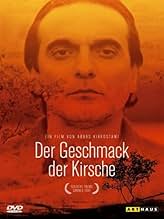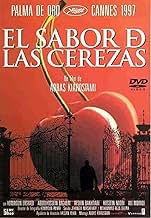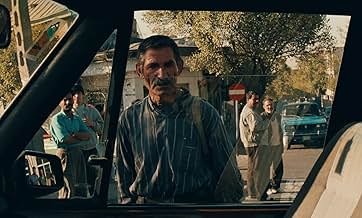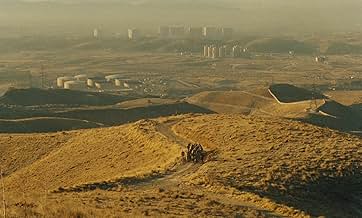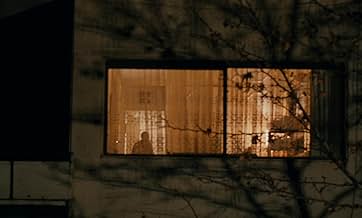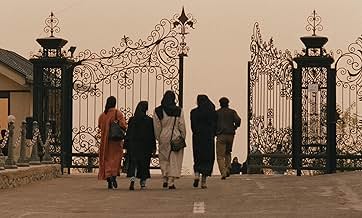Um homem iraniano dirige seu caminhão procurando alguém para enterrá-lo silenciosamente baixo uma cerejeira depois que ele comete suicídio.Um homem iraniano dirige seu caminhão procurando alguém para enterrá-lo silenciosamente baixo uma cerejeira depois que ele comete suicídio.Um homem iraniano dirige seu caminhão procurando alguém para enterrá-lo silenciosamente baixo uma cerejeira depois que ele comete suicídio.
- Direção
- Roteirista
- Artistas
- Prêmios
- 3 vitórias e 5 indicações no total
Avaliações em destaque
worried that, as a filmmaker, Kiarostami would be as inaccessible
as Godard in the 80s. I was pleasantly surprised by A TASTE OF
CHERRY. It's a linear narrative, and the film's early ambiguity
concerning the driver's quest kept me guessing (I knew nothing
about this film going in, which was a real plus). The film's unusual
visual style, particularly the long unedited takes, works surprisingly
well for this type of story. I can understand why traditional
American filmgoers would be bored to tears by A TASTE OF
CHERRY, but for fans of independent and foreign film, it's a
worthwhile investment of your time. It probably works better with
an older audience that can identify with the world-weary
characters.
Iran has a very young film industry that doesn't have the money or resources that many other film industries have. For what the Iranian film industry has at its disposal, this film is an exceptional achievement!
This film is a great example of how the expression of human beings' feelings and ideas cannot be held back by censorship. Kudos to Kiarostami for creating a very heartfelt commentary on the effects of oppression on the human soul.
From the beginning to the end, Kiarostami gives us a complex script of characters that we come into contact with, and as we learn about each one, we learn more about the idea of life. What makes the film very interesting for a Western viewer is that I find closer to Kiarostami's Iran after each of his films that I watch, and become more informed to it. We learn intimate details about the lives of several Iranians.
Throughout the film I found that, although like many of his films it was quite slow-paced, it contained the extraordinarily rich dialog that is expected of a Kiarostami film. His films advance through their rich dialog while using the dusty Iranian landscape as their backdrop. I found a lot of the cinematography to be terrific, viewing the city from a distance and looking into the dusty foot-hills on the outskirts of Tehran. It is more than poetic to see a man at the end of his rope searching through the dust and faces of Tehran's poor laborers for answers about life and death. In many ways, the film is a large metaphor for the human state of affairs.
The film culminates very well, and we all eventually find our own taste of cherry in the film. I always feel as if Kiarostami's films are a very philosophical experience, and are quite personal. In this sense, Kiarostami's films are amongst the best that I have seen.
However, they are undoubtedly slower paced than other films, and they require the viewer to detach himself from any western stereotypes that he has about film. This would not be a good film for somebody expecting action or a typical Western film, but rather, this would be a film that I would recommend only to those who are in the mood for an insightful, philosophical film that shows an alternative view of life. Overall, it was an emotionally powerful film that will stick out in my memory as all Kiarostami films do.
There are critics who call this kind of untouched-by-art realism genius, who say that Kiarostami is making us think, reconsider the very nature of cinema, and so on. To my mind, the message of the film-- the taste of cherry makes life worth living-- is no more or less profound than, say, Woody Allen rattling off a few of the things that make life worth living in Manhattan, or the epiphany the kid in American Beauty gets from a plastic bag. (Likewise the message that it's all only a movie. Never woulda guessed.) And critics who find such a message shallow in a piece of slick entertainment, but deep when it's in a deliberately unentertaining art film, need to reexamine their critical principles, or lighten up a little-- or at least go see again the work of real art Kiarostami alludes to in his title, Wild Strawberries, which has more depth of characterization and emotional richness in any five minutes than this manages to scrounge up in an hour and a half.
Through the dialogue between different people from different classes, everyone has his own attitude about "life & death". I think we can't say which is right & which is wrong. Abbas only gives it to us & let us think for ourselves.
Every scene is simple & ordinary, but has a certain strange fascination. I have seen "Through The Olive Trees" before (also directed by Abbas). To be honest, I don't like it, although it's said to be a good film. But this one is different. "Go see it" is what I want to say.
Você sabia?
- CuriosidadesThe film was shot without a proper script, relying on improvisations.
- Erros de gravaçãoIn the opening scene, as Mr. Badhi is driving past laborers looking for work, the same middle-aged white haired man, wearing a checkered sweater vest, is seen twice.
- Citações
Mr. Bagheri: If you look at the four seasons, each season brings fruit. In summer, there's fruit, in autumn, too. Winter brings different fruit and spring, too. No mother can fill her fridge with such a variety of fruit for her children. No mother can do as much for her children as God does for His creatures. You want to refuse all that? You want to give it all up? You want to give up the taste of cherries?
- ConexõesFeatured in Especial Cannes: 50 Anos de Festival (1997)
Principais escolhas
- How long is Taste of Cherry?Fornecido pela Alexa
Detalhes
- Data de lançamento
- Países de origem
- Centrais de atendimento oficiais
- Idiomas
- Também conhecido como
- El sabor de las cerezas
- Locações de filme
- Empresas de produção
- Consulte mais créditos da empresa na IMDbPro
Bilheteria
- Faturamento bruto mundial
- US$ 12.187


